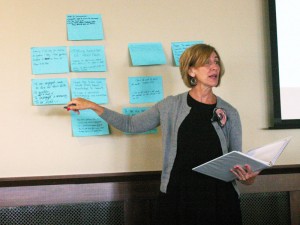By Celine Klosterman
The Catholic Messenger
IOWA CITY — After receiving the sacrament of confirmation, Catholics should be on fire to share their faith, Jane Angha told about 20 catechists at St. Patrick Church last month.
To help Church leaders fuel that fire, Angha, a representative of the Center for Ministry Development, led the workshop “Confirming Young Disciples: Vision and Practice for Preparing Adolescents for Confirmation.”

She asked participants to reflect on their personal experience of confirmation and then provided a brief history of the sacrament. First-century Christians were baptized with water and the laying on of hands by a bishop, she noted. In the second century, anointing with oil was added to the rite of baptism. By the year 300, as infant baptism grew more common, bishops could no longer preside at each baptism. Priests took on this responsibility. Then, in 412, Pope Innocent I insisted that only bishops anoint with oil, separate from baptism. This marked the first use of the term “confirmation.”
For most of Church history, Catholics received confirmation before first Communion. But in 1910, Pope Pius X lowered the age at which children could receive first Communion from about age 12 to age 7. This resulted in children receiving their first Eucharist before being confirmed.
Today, the age for reception of confirmation varies among dioceses and parishes. In the United States, the range is from the age of discretion (age 7) to age 16.
Preparation for confirmation should lead Christians toward intimacy with Christ, awaken a sense of belonging to the Church and ensure they can assume the apostolic responsibilities of Christian life, Angha noted. The sacrament is not a “youth’s choice to ratify baptism” or “becoming an adult in the faith” — misconceptions that still exist, she said. As the Catechism explains, “Although confirmation is sometimes called the ‘sacrament of Christian maturity, we must not confuse adult faith with the adult age of natural growth, nor forget that the baptismal grace is a grace of free, unmerited election and does not need ‘ratification’ to become effective.”
Confirmation candidates must be suitably instructed, properly disposed and able to renew their baptismal promises, according to Canon Law. A person to be confirmed must have an attitude of openness, a relationship with God and with the universal and local Church.
Research shows that unless Catholics are actively involved in the Church long before confirmation, they won’t get involved after receiving the sacrament, Angha said. Formation of young disciples begins in the family and parish, and continues with comprehensive youth ministry, catechesis and confirmation preparation.
Youths long for an encounter with Christ, a place to belong, a way to understand and a chance to serve, Angha said. Catechists help students meet these needs through the Church.
She offered a model of confirmation preparation that begins with youths’ encounters with God — such as retreats, affective prayer and service. Students then receive formation that helps them develop their faith identify and to connect with the parish.
Four types of communities can help a youth grow in faith. These include peer groups where youths learn the faith in a developmentally appropriate way; families that share faith through lived practices; parishes that form faith through worship, learning and service with members of multiple generations; and the wider community, including large conferences and the media.
“Our Church is an attractive place,” Angha said. “We need to inspire people to want to be a part of it….We have big, important jobs and, like Moses, we may not feel qualified, but we step out in faith every day and do our best.”
For resources, visit www.youthministryaccess.org or www.fashioningfaith.org.







